首页 > 代码库 > 配置Exchange 2016分层通讯薄(HAB)
配置Exchange 2016分层通讯薄(HAB)
通过使用分层通讯簿 (HAB),最终用户可以利用组织的分层结构查找通讯簿中的收件人。通常,用户仅限于默认全局地址列表 (GAL) 及其收件人属性,GAL 的结构通常不会反映组织中收件人的管理或资历关系。能够自定义 HAB 以反映您的组织独特的业务结构,这可以为您的用户提供查找内部收件人的高效方法。创建完成后的效果如下:
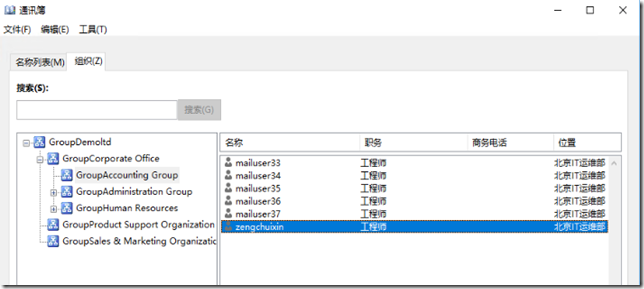
一般步骤如下:
创建用于根组织(顶层)的通讯组。如果需要,可以将 Exchange 林中现有的组织单位用作通讯组。
创建子层的通讯组并将其指定为 HAB 成员。修改这些组的 SeniorityIndex 参数,使其以正确的层次结构顺序在根组织内列出。
添加组织成员。修改成员的 SeniorityIndex 参数,使其以正确的层次结构顺序在子层内列出。
出于提供辅助功能的目的,可以使用 PhoneticDisplayName 参数,它指定了 DisplayName 参数的拼音发音。
尽管不能使用 EAC 启用 HAB,但启用 HAB 后可以使用 EAC 管理组织层次结构中的组成员身份。
例如,将要为 HAB 创建名为 HAB 的 OU。组织的域名为 demo,Demoltd将成为层次结构中顶级组织(“根组织”)的名称。将在 Demoltd下创建名为 Corporate Office、Product Support Organization 和 Sales & Marketing Organization 的下属组作为其子组织。此外,将在 Corporate Office 下创建组 Human Resources、Accounting Group 和 Administration Group 作为其子组织。
(一)demo 组织中创建名为 HAB 的 OU
您可以使用 Active Directory 用户和计算机,或在命令提示符中键入下列内容。
注意:HAB的根不一定要新建一个OU,也可以直接指定当前组织中存在的通讯组OU。

打开AD用户和计算机,可以看到新建的HAB OU。
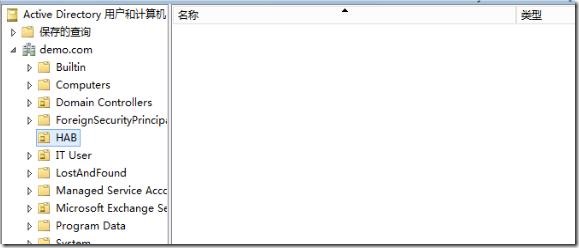
(二)为 HAB 创建根通讯组 Demoltd
![]()
也可以使用图形界面创建根通用通讯组,放在HAB OU里面。
下面使用exchange management shell创建:
New-DistributionGroup -Name "Demoltd" -DisplayName "Demoltd" -Alias "DemoRoot" -OrganizationalUnit
"demo.com/HAB" -SamAccountName "DemoRoot" -Type "Distribution"

(三)将 Demoltd 指定为 HAB 的根组织
在exchange management shell中执行:
Set-OrganizationConfig -HierarchicalAddressBookRoot "DemoRoot"
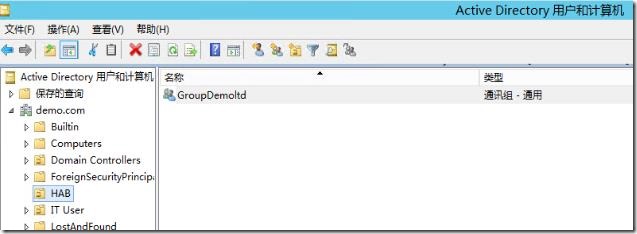
设置成根组织后,HAB的层次结构下所有的通讯组都挂在这个根通讯组下面。
(四)在 HAB 中创建其他层的通讯组
例如,您要创建下列组:Corporate Office、Product Support Organization、Sales & Marketing Organization、Human Resources、Accounting Group 和 Administration Group。本示例创建通讯组 Corporate Office。
注意:下面创建通讯组的过程可以借助图形界面或者脚本来完成。
在exchange management shell中执行下面的命令:
New-DistributionGroup -Name "Corporate Office" -DisplayName "Corporate Office" -Alias "CorporateOffice" -OrganizationalUnit "demo.com/HAB" -SamAccountName "CorporateOffice" -Type "Distribution"
New-DistributionGroup -Name "Product Support Organization" -DisplayName "Product Support Organization" -Alias "ProductSupportOrganization" -OrganizationalUnit "demo.com/HAB" -SamAccountName "Product Support Organization" -Type "Distribution"
New-DistributionGroup -Name "Sales & Marketing Organization" -DisplayName "Sales & Marketing Organization" -Alias "SalesMarketingOrganization" -OrganizationalUnit "demo.com/HAB" -SamAccountName "Sales & Marketing Organization" -Type "Distribution"
New-DistributionGroup -Name "Human Resources" -DisplayName "Human Resources" -Alias "HumanResources" -OrganizationalUnit "demo.com/HAB" -SamAccountName "Human Resources" -Type "Distribution"
New-DistributionGroup -Name "Accounting Group" -DisplayName "Accounting Group" -Alias "AccountingGroup" -OrganizationalUnit "demo.com/HAB" -SamAccountName "Accounting Group" -Type "Distribution"
New-DistributionGroup -Name "Administration Group" -DisplayName "Administration Group" -Alias "AdministrationGroup" -OrganizationalUnit "demo.com/HAB" -SamAccountName "Administration Group" -Type "Distribution"
创建完成后,如图。
下图创建的结果前面都加上了Group,原因是我在ex2016中创建了组命名策略,对于所有创建的组前面自动加上Group标签。
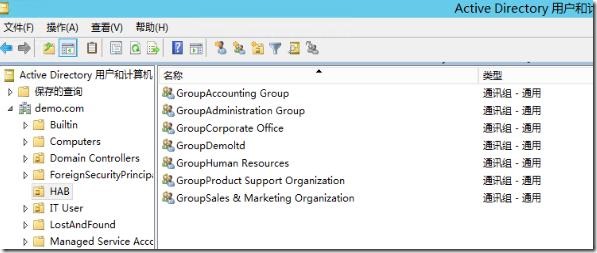
(五)将每个组指定为 HAB 成员
例如,您要将下列组指定为层次结构组:demoltd、Corporate Office、Product Support Organization、Sales & Marketing Organization、Human Resources、Accounting Group 和 Administration Group。该示例将通讯组 Contoso,Ltd 指定为 HAB 的成员
Set-Group -Identity "Groupdemoltd" -IsHierarchicalGroup $true
Set-Group -Identity "GroupCorporate Office" -IsHierarchicalGroup $true
Set-Group -Identity "GroupProduct Support Organization" -IsHierarchicalGroup $true
Set-Group -Identity "GroupSales & Marketing Organization" -IsHierarchicalGroup $true
Set-Group -Identity "GroupHuman Resources" -IsHierarchicalGroup $true
Set-Group -Identity "GroupAccounting Group" -IsHierarchicalGroup $true
Set-Group -Identity "GroupAdministration Group" -IsHierarchicalGroup $true
(六)将每个下属组添加为根组织的成员
例如,在 HAB 中将通讯组 Corporate Office、Product Support Organization 和 Sales & Marketing Organization 添加为根组织 Contoso,Ltd 的成员。该示例将 Corporate Office 通讯组添加为 Contoso,Ltd 根通讯组的成员。
Add-DistributionGroupMember -Identity "DemoRoot" -Member "CorporateOffice"
Add-DistributionGroupMember -Identity "DemoRoot" -Member "Product Support Organization"
Add-DistributionGroupMember -Identity "DemoRoot" -Member "Sales & Marketing Organization"
上面的成员添加也可以通过图形界面完成,可以在AD中找到通讯组,添加成员关系,如图。
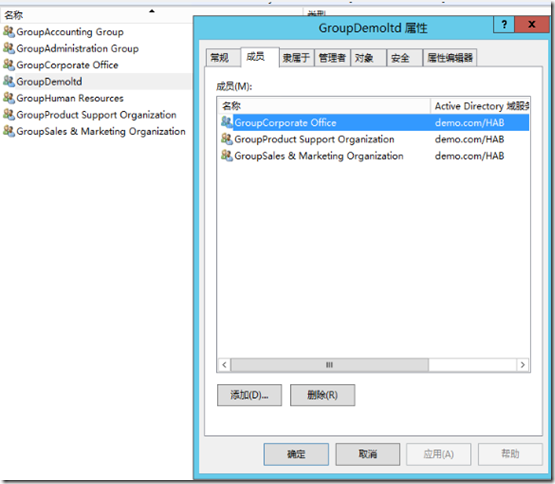
或者在exchange管理中心中修改,如图。
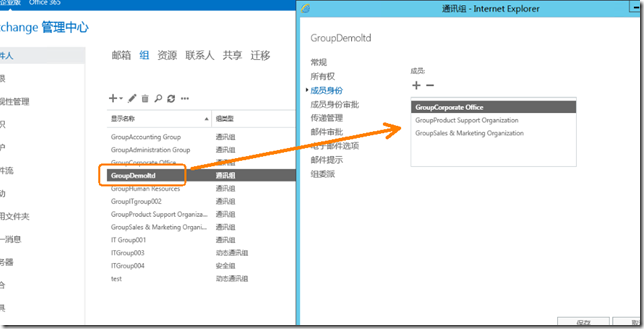
(七)将附属于通讯组 Corporate Office 的每个组添加为该组的成员
例如,将通讯组 Human Resources、Accounting Group 和 Administration Group 添加为通讯组 Corporate Office 的成员。该示例将 Human Resources 通讯组添加为 Corporate Office 通讯组的成员。
Add-DistributionGroupMember -Identity "CorporateOffice" -Member "HumanResources"
Add-DistributionGroupMember -Identity "CorporateOffice" -Member "Accounting Group"
Add-DistributionGroupMember -Identity "CorporateOffice" -Member "Administration Group"
注意:以上操作同样可以在AD的通讯组管理界面或者exchange管理中心中进行添加。
添加完成后,如图。
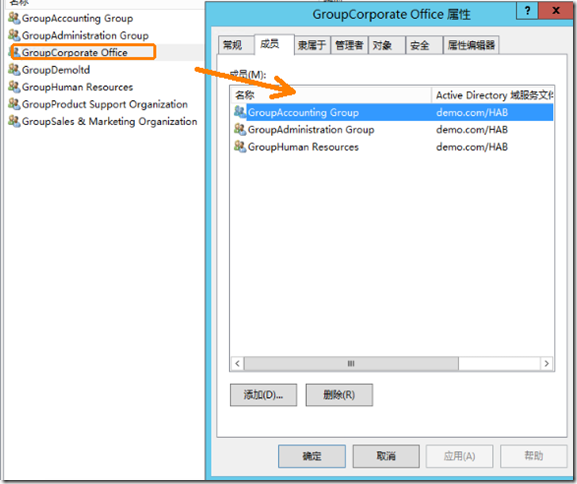
(八)在 HAB 中将用户添加到组
备注:这一步操作无关紧要,通讯组用户的添加或者删除可以通过AD或者exchange的管理工具来实现,如图。
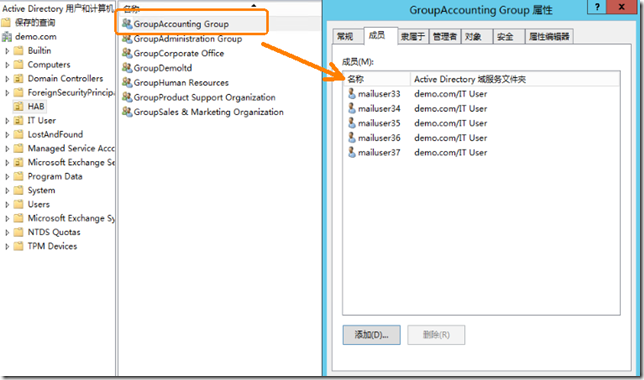
也可以使用命令添加:
Add-DistributionGroupMember -Identity "CorporateOffice" -Member "zengchuixin"
下面的第九和第十个步骤是设置HAB中通讯组和用户的显示优先级别的,通过调整优先级别可以选择让谁显示在上面,谁显示的更靠前。
(九)为 HAB 中的组设置 SeniorityIndex 参数
例如,Corporate Office 组包含三个子组:Human Resources、Accounting Group 和 Administration Group。相较于默认的将组按字母升序排列,首选排序为 Human Resources (SeniorityIndex = 100)、Accounting Group (SeniorityIndex = 50),然后是 Administration Group (SeniorityIndex = 25)。该示例将 Human Resources 组的 SeniorityIndex 参数设置为 100。
Set-Group -Identity "Human Resources" -SeniorityIndex 100
注意:
SeniorityIndex 参数是数字值,用于在 HAB 中将组或用户按数字降序进行排列。如果没有设置 SeniorityIndex 参数,或两个或更多用户的此参数值相同,那么 HAB 排序顺序使用 PhoneticDisplayName 参数值,以字母升序顺序列出用户。如果没有设置 PhoneticDisplayName 值,HAB 排序顺序默认为 DisplayName 参数值,并以字母升序顺序列出用户。
(十)为 HAB 组中的用户设置 SeniorityIndex 参数
例如,Corporate Office 组包含三位用户:Amy Alberts、David Hamilton 和 Rajesh M. Patel。相较于默认的将用户按照字母升序排列,首选排序为 David Hamilton (SeniorityIndex = 100)、Rajesh M. Patel (SeniorityIndex = 50),然后是 Amy Alberts (SeniorityIndex = 25)。该示例将用户 David Hamilton 的 SeniorityIndex 参数设置为 100。
Set-User -Identity "zengchuixin@demo.com" -SeniorityIndex 100
完成上述步骤之后,HAB 将显示在 Outlook 中。若要查看 HAB,请打开 Outlook,然后单击“通讯簿”。HAB 显示在“组织”选项卡上,与下图类似。
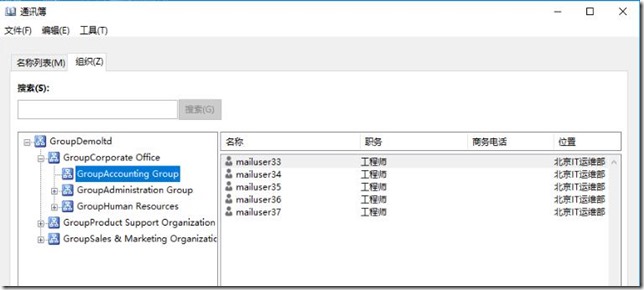
(十一)如何禁用HAB组织?
Set-OrganizationConfig -HierarchicalAddressBookRoot $null
该命令不会删除用于 HAB 结构的根组织或子组,也不会重置组或用户的 SeniorityIndex 值。仅阻止 HAB 显示于 Outlook 中。要再次启用具有相同配置设置的 HAB,您只需再次启用根组织。
本文出自 “曾垂鑫的技术专栏” 博客,谢绝转载!
配置Exchange 2016分层通讯薄(HAB)
